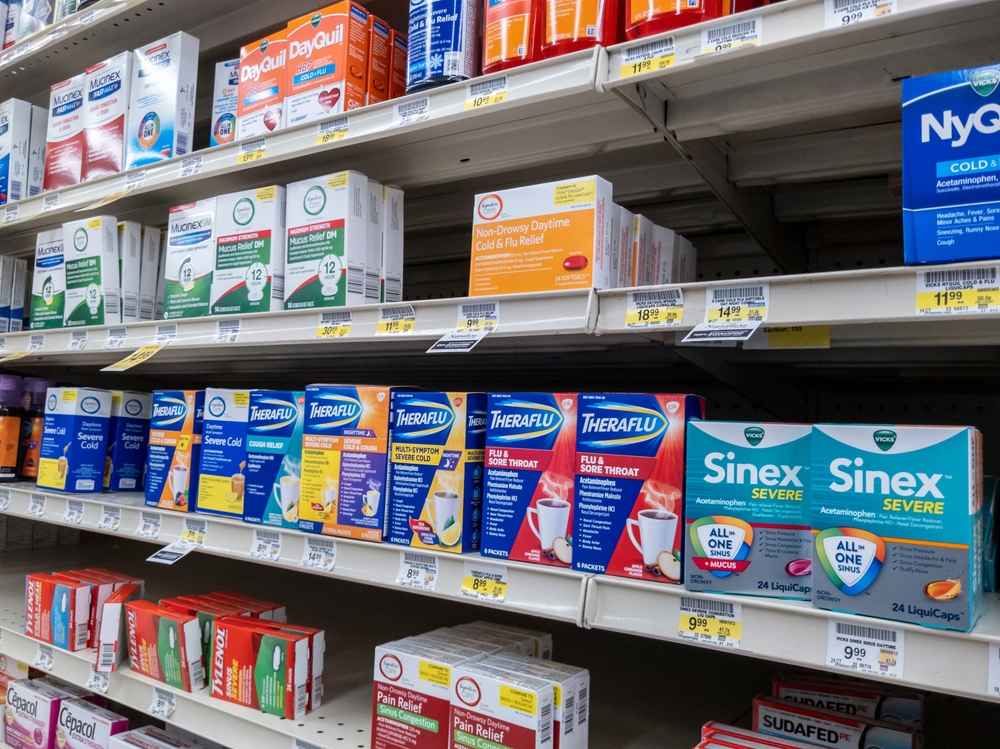For years, people suffering from congestion, the common cold, or the flu have relied on the drug phenylephrine, which is found in over-the-counter medicines like Sudafed PE, Vicks Nyquil Sinex Nighttime Sinus Relief, and Benadryl Allergy Plus Congestion. Last year in the United States, these medications earned almost $1.8 billion in sales for the drug manufacturing industry.
Although phenylephrine has been available since the 1970s, it experienced a significant rise in popularity due to the landmark law, the Combat Methamphetamine Epidemic Act of 2005.
Because of the Act, over-the-counter medicines, including pseudoephedrine products like Sudafed, underwent distribution changes due to how they could be used to make illegal methamphetamine.
The law requires that only adults over the age of 18 can purchase pseudoephedrine, and while a prescription is not required, it can only be sold behind the pharmacy counter.
Fast Forward almost two decades after the regulations went into effect. Drug manufacturers and consumers have become dependent on easily accessible oral phenylephrine, which can still be purchased on store shelves. As the major alternative to pseudoephedrine, it has been marketed to consumers as a good decongestant due to its ability to reduce swollen blood vessels in nasal passages.
However, in September, an advisory committee for the Food and Drug Administration (FDA) announced a decision that has been in the works for almost as long as the 2005 law. Products that contain oral phenylephrine are ineffective.
According to several studies, when taken orally (as opposed to a nasal spray), not enough phenylephrine makes it to the nasal passages to combat the decongestion. In its announcement, the committee stressed that the decision was based on several studies going back as far as 2007 (as well as a 2018 effort that led to an agency warning that the data was showing the drug's effectiveness was not reliable).
It is expected that later this year, the FDA will decide whether or not to revoke phenylephrine’s OTC designation as “generally recognized as safe and effective.” The designation is valuable to drugmakers because they can include an ingredient in OTC medicines without having to file an FDA application.
Currently, phenylephrine is a main ingredient in such products as Sudafed Sinus Congestion, Tylenol Cold & Flu Severe, NyQuil Severe Cold & Flu, Theraflu Severe Cold Relief, Mucinex Sinus-Max, and others.
If the FDA decides to take away the OTC designation, manufacturers would be forced to pull countless boxes of medications from shelves. For consumers who have been using the products, they have more pressing concerns. Not only will they need to find an effective product, but they also are learning they’ve been relying for years on drug manufacturers to sell them safe and reliable medication. They now recognize that has not been the case.
Lawsuits Against Decongestant Manufacturers
Already, consumers are taking legal action against drug manufacturers.
In Florida, a class action suit has been filed against Proctor & Gamble and Johnson & Johnson Consumer Inc. (now known as Kenvue). According to news reports, the plaintiff purchased Sudafed PE, Benadryl Allergy Plus Congestion, and Vicks NyQuil.
While he believed the products would work, they did not, and he alleges that with the new decision by the FDA committee combined with the 2018 guidance, drug manufacturers should have known their marketing claims were “false and deceptive.’’ A second lawsuit, similar in allegations, has been filed in New Jersey. It names Walgreens, Kenvue, and Procter & Gamble as defendants.
Using OTC decongestants is a typical way to ease cold or congestion symptoms. According to the Consumer Healthcare Products Association, sales data from the past year show that half of all households in the U.S. have purchased an OTC medicine containing PE, and nearly seven in ten of them have also repurchased products containing PE. They believe Americans – and the overall healthcare system – would be significantly burdened if oral PE were not available OTC.
In light of the FDA committee's decision, those relying on oral medications with phenylephrine as a main ingredient may want to consider contacting a lawyer and/or joining a class action for a group of plaintiffs to represent an even larger number of victims.
American consumers should be able to trust drug manufacturers to distribute safe drugs and market and sell only effective products while not misleading those who depend on the medicine.













